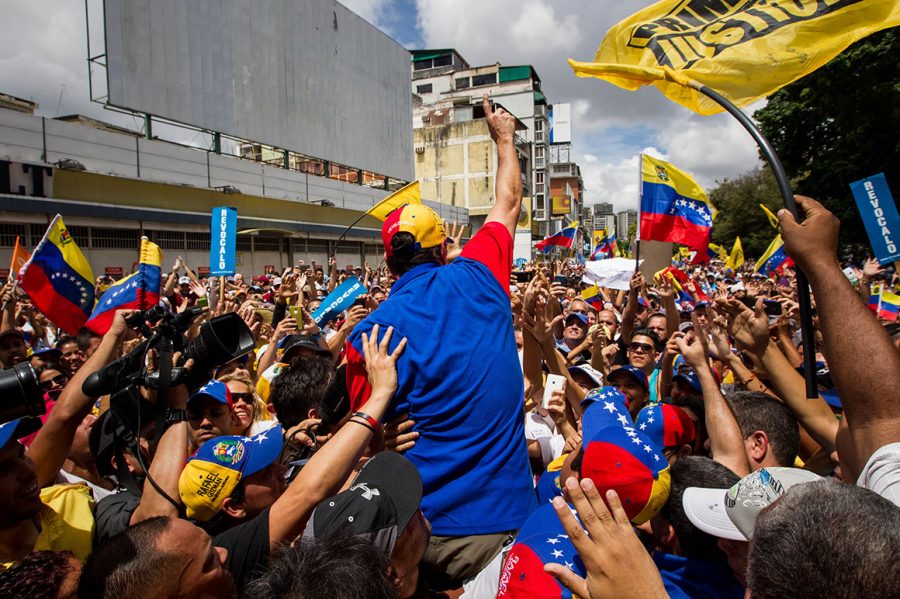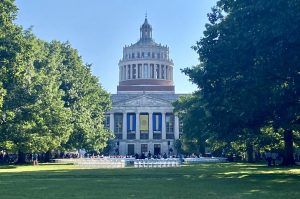Chaos and corruption: Venezuela’s crisis
May 2, 2019
Venezuela is a dying nation. The country has been bleeding out since 2010, when the late Hugo Chávez declared an “economic war”. Ever since then, Venezuela has fallen into a downward spiral, landing them where they are now, in a state of anarchy and widespread poverty. Currently, even the presidency is contested. Some claim that Nicolás Maduro remains the legitimate president, but others say that it’s Juan Guaidό – the self-declared acting president and leader of the opposition. Today, it’s hard to imagine that Venezuela once had the fourth highest GDP in the world, but in the 1950s, that was the case.
But now, the country is in ruins. Since 2015, a whopping three million have left the country. Those who stayed have suffered through what the Mercy Corps are calling the worst humanitarian crisis in the Western Hemisphere. In order to really see the gravity of the issue, one should consider the fact that back in 2017, more than 73 Venezuelans died violent deaths every day. In addition, around 90% of Venezuela’s population still lives under the poverty line, and inflation has risen to 1.62 million percent. But the numbers only tell a portion of the story. In an interview with Laissez Faire, native Venezuelan Mariana Salvador disclosed how it truly is to experience the crisis firsthand. “Like me, many young people in the country hope to have the first opportunity to leave the country and go for a better life. What you see in the news is nothing compared to reality. The reality of Venezuela surpasses any news stories.”
Venezuelans who have managed to escape go to Colombia, often end up selling products on the street, earning as little as $2 a day, only to send the money back to Venezuela. These people are subject to discrimination and exploitation, with Venezuelan women being at an especially high risk of harassment, rape, and human trafficking. The mass migration into Colombia has hit hard, leaving even less opportunity where it was already scarce.
Still, things continue to worsen in Venezuela. On February 6, US Secretary of State Mike Pompeo demanded that Venezuela’s government open up the Tienditas bridge on the border with Colombia, where foreign aid was stationed. Maduro responded by sending soldiers to block the bridge with trucks in order to stop the flow of supplies, and burned food in front of the starving. Shortly after on February 24, Maduro severed all political and diplomatic ties with Colombia, calling their government fascist and giving all Colombian political figures 24 hours to leave the country. On February 26, Jorge Ramos – a very well known Latin American journalist – and his team were detained without reason after an interview with Maduro. And most recently, on March 7, the country began to experience nationwide blackouts, which continued, and left several areas of the country without potable water.
As of late, the US has been attempting to mediate the Venezuelan crisis. They have launched several attempts to intervene both politically and economically for the country’s suffering masses. However, it is important to note that the United States has also appointed Elliot Abrams as the special envoy to Venezuela. This is the same Abrams which shrugged off a massacre of a thousand men, women, and children by US troops in El Salvador during the Reagan administration, saying that “the administration’s record in El Salvador is one of fabulous achievement.” NBC reported on the exchange between Abrams and Minnesota State Representative Ilhan Omar at a Venezuela hearing. When Omar asked, “Yes or no, would you support an armed faction within Venezuela that engages in war crimes against humanity or genocide if you believe they were serving US interest as you did in Guatemala, El Salvador, and Nicaragua?” Abrams simply replied, “I am not going to respond to that question.” The decision to appoint Elliot Abrams as special envoy to Venezuela is one that leaves the future looking bleak. Considering both his reputation and the point Omar made about his disastrous effect on the people of El Salvador, there is a high probability that he will have the same effect as the Reagan administration on Venezuela.
The worldwide ignorance that surrounds this issue is the most startling aspect of the entire situation. This is currently one of the worst humanitarian crises in the world, and while there has been extensive news coverage, much of the public has become callous and desensitized to issues like these. We can no longer turn a blind eye to situations as dire as this one, and keep living our first-world lives without interruption. However, there is hope in the fact that volunteer organizations are reaching out. The Red Cross managed to come to an agreement with the Catholic Bishops Episcopal Conference in Venezuela, and has been granted permission to expand their aid by the Venezuelan government. The organization hopes to help Venezuela restore their tattered healthcare system and provide services like water, sanitation, and hygiene. Hopefully, with some more help from the masses and the incoming aid, Venezuela’s future could go from bleak to bright.













































